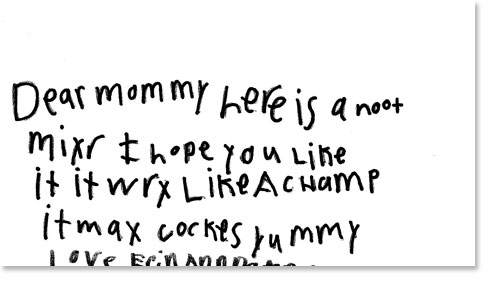Readers of this blog know that I love writing samples. I’ve collected them from my kids since they started scribbling, and I often ask friends and neighbors if I can make a copy of their kids notes, assignments, or scribbles.
Children learn about reading and writing from the time they’re born. When young kids watch parents and siblings use writing to communicate, they are learning about the purpose and value of writing. Many children become interested in making marks and scribbling on paper beginning around 18 months.
Teachers and parents can learn so much about a child’s development by looking closely at a sample. Today’s sample (I think I’ll run this feature semi-regularly) is the gift card I got on a birthday present last year.

In this sample we can see a healthy use of sight words (dear, mommy, here is, hope, like). There’s evidence of a concept of word, although the spacing is tight. The use of the phrase, “It works like a champ,” is heartwarming to me, and reinforces the importance of a language-rich environment at home.
Oh, and by the way, that mixer really does “make cookies yummy!”

